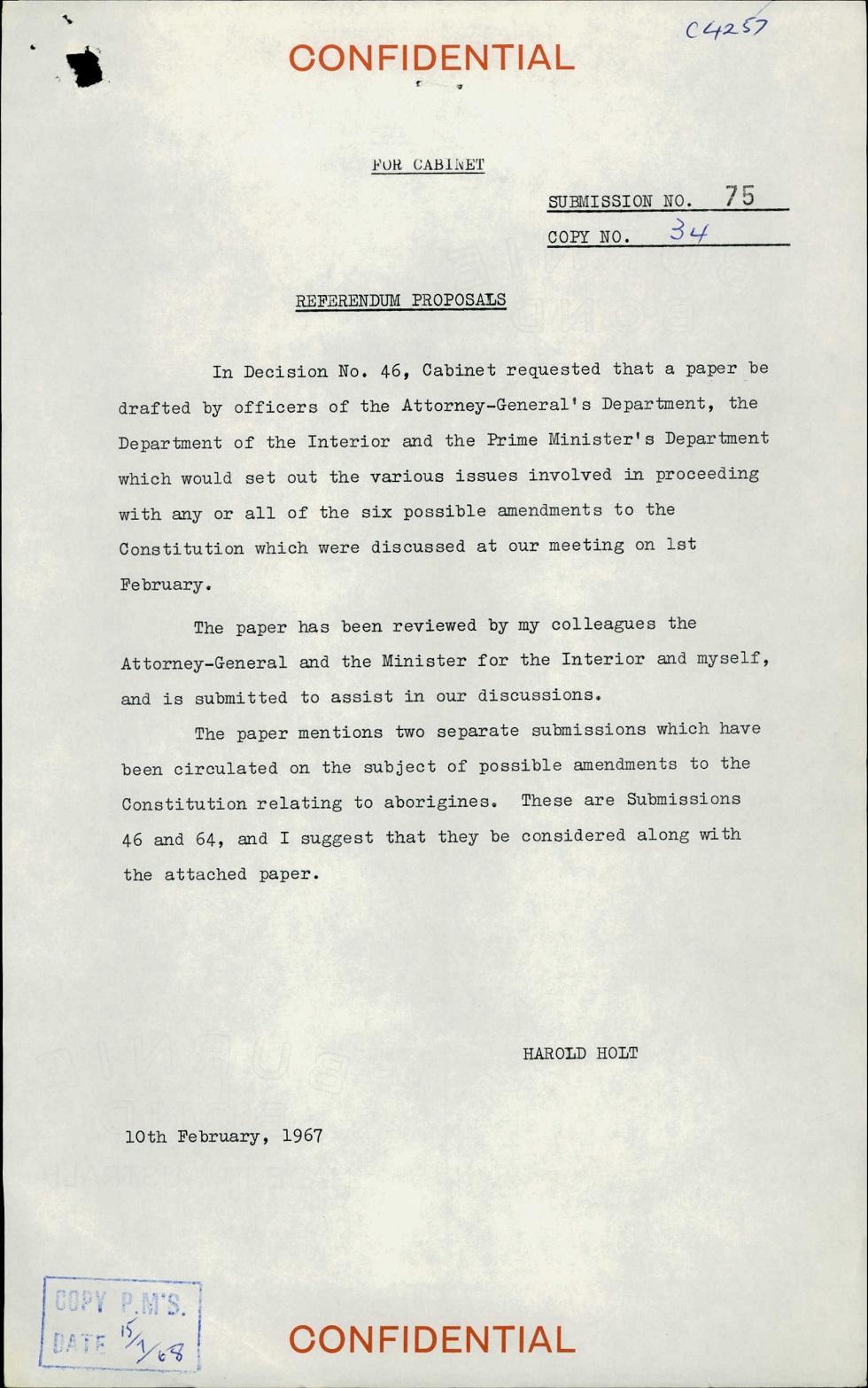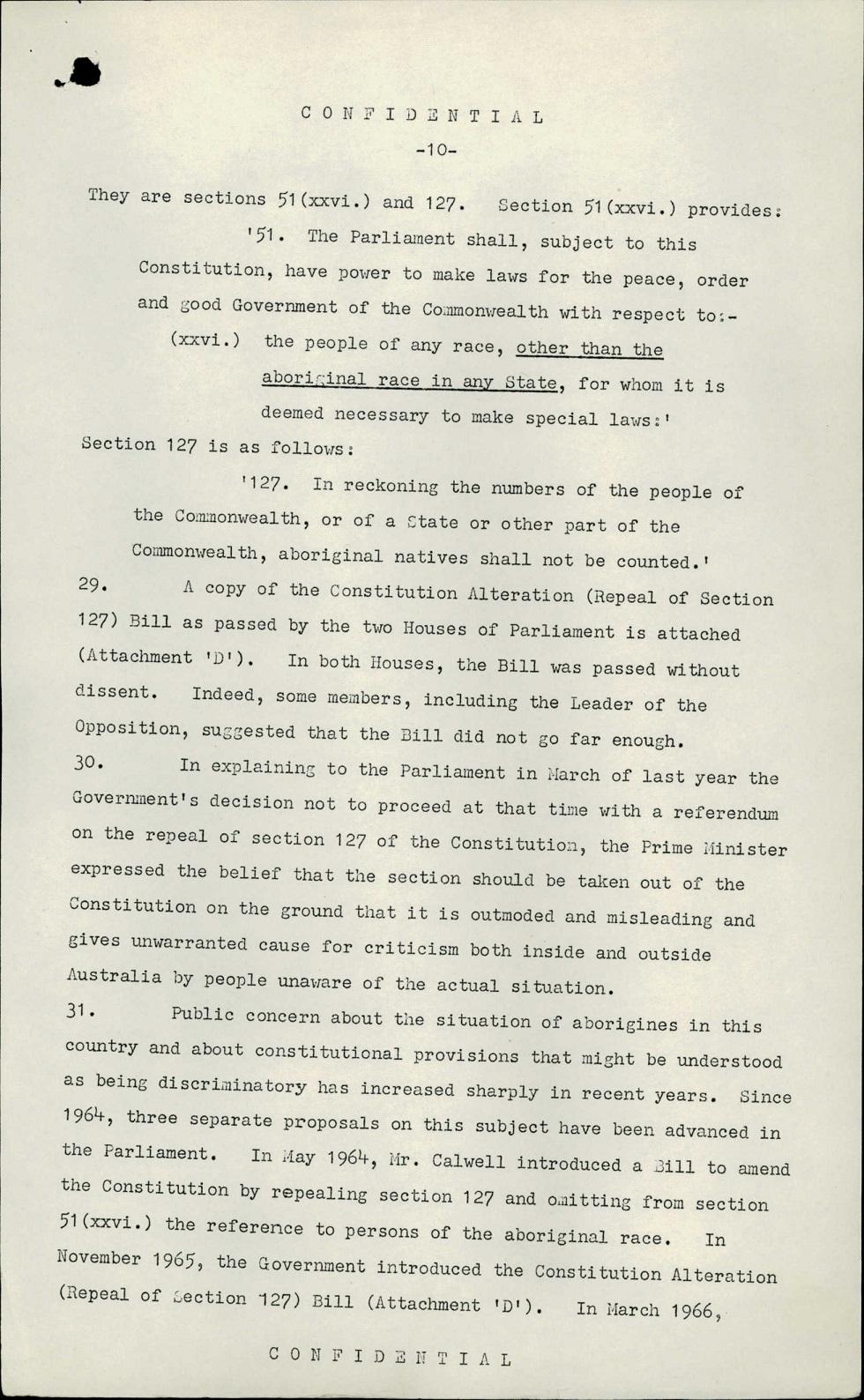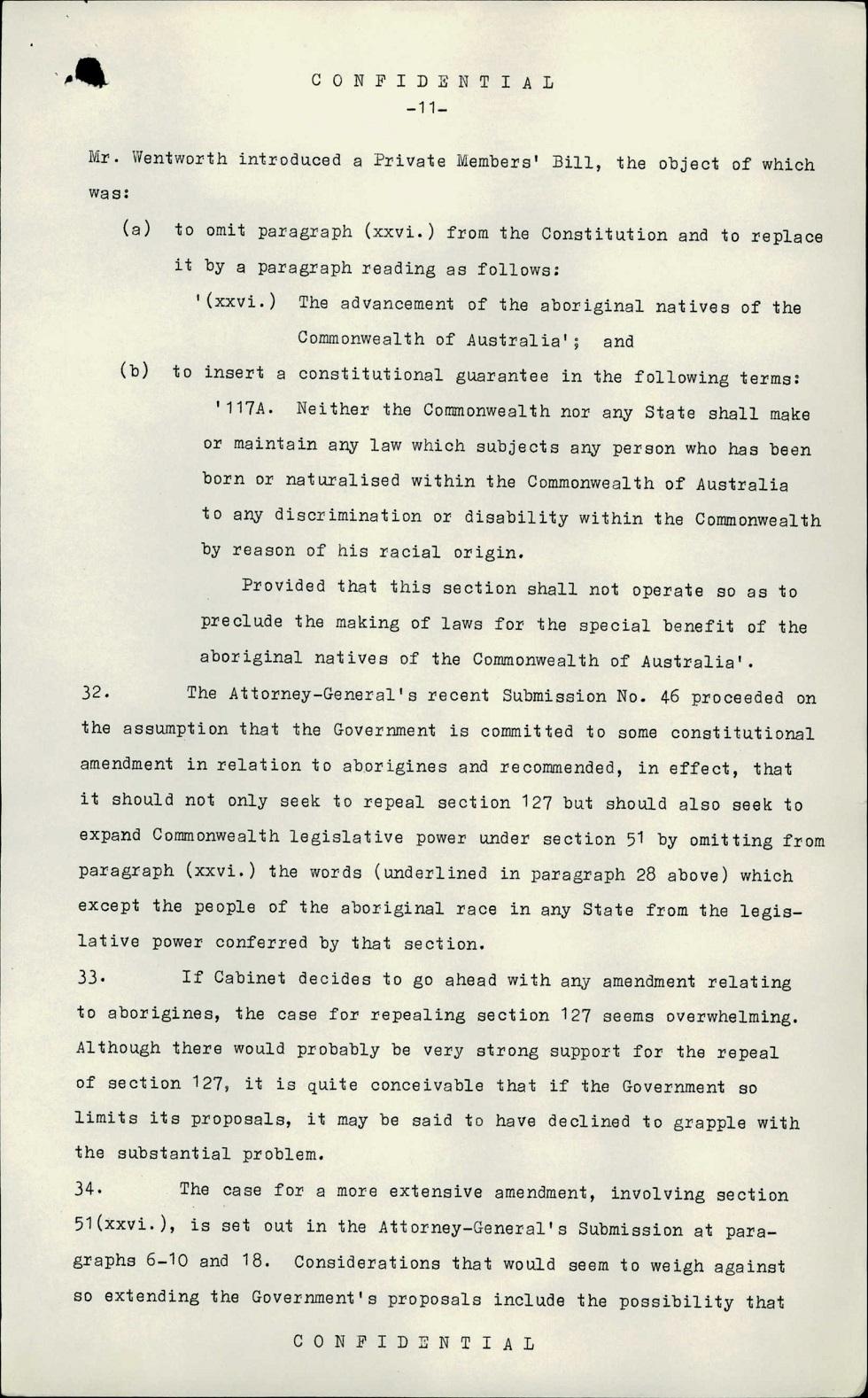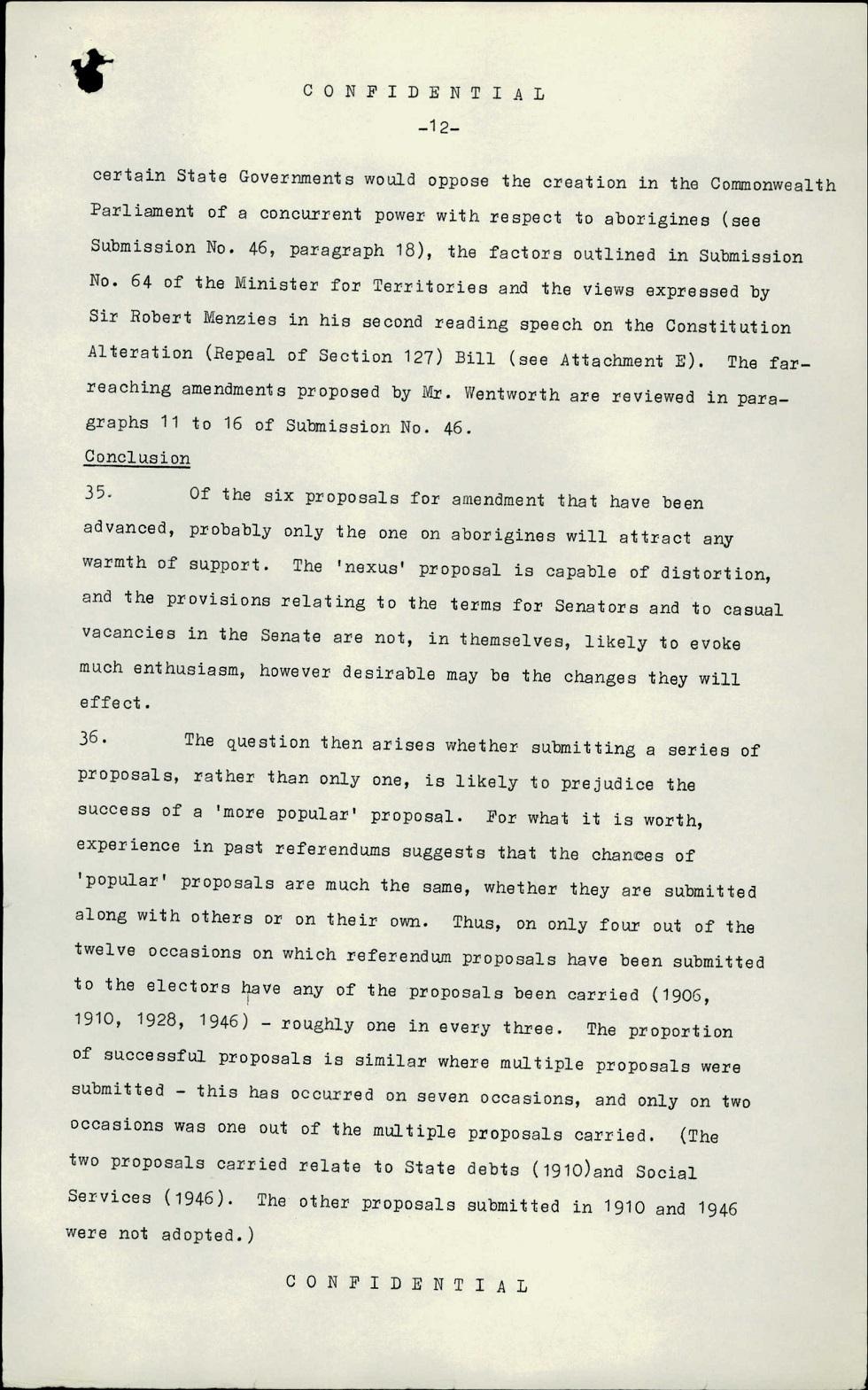



Aboriginal and Torres Strait Islander people should be aware that the National Archives' website and collection contain the names, images and voices of people who have died.
Some records include terms and views that are not appropriate today. They reflect the period in which they were created and are not the views of the National Archives.





[Page 1.]
[Header in red capital letters:] CONFIDENTIAL
[Handwritten in blue ink in top right corner:] C4257
[Underlined subheading:] FOR CABINET
[Underlined:] SUBMISSION NO. [stamped number] 75
COPY NO. [handwritten number] 34
[Underlined subheading:] REFERENDUM PROPOSALS
In Decision No. 46, Cabinet requested that a paper be drafted by officers of the Attorney-General's Department, the Department of the Interior and the Prime Minister's Department which would set out the various issues involved in proceeding with any or all of the six possible amendments to the Constitution which were discussed at our meeting on 1st February.
The paper has been reviewed by my colleagues the Attorney-General and the Minister for the Interior and myself, and is submitted to assist in our discussions.
The paper mentions two separate submissions which have been circulated on the subject of possible amendments to the Constitution relating to aborigines. These are Submissions 46 and 64, and I suggest that they be considered along with the attached paper.
HAROLD HOLT
10th February, 1967
[Footer in red capital letters:] CONFIDENTIAL
[Stamped in blue ink: 'COPY P.M'S.', 'DATE', with
handwritten date '15/7/68'.]
[Page 2.]
[Typed header:] CONFIDENTIAL
[Page number:] -10-
They are sections 51 (xxvi.) and 127. Section 51 (xxvi.) provides:
'51. The Parliament shall, subject to this Constitution, have power to make laws for the peace, order and good Government of the Commonwealth with respect to: -
(xxvi.) the people of any race, [underlined phrase] other than the aboriginal race in any State, [end underline] for whom it is deemed necessary to make special laws:'
Section 127 is as follows:
'127. In reckoning the numbers of the people of the Commonwealth, or of a State or other part of the Commonwealth, aboriginal natives shall not be counted.'
29. A copy of the Constitution Alteration (Repeal of Section 127) Bill as passed by the two Houses of Parliament is attached (Attachment 'D'). In both Houses, the Bill was passed without dissent. Indeed, some members, including the Leader of the Opposition, suggested that the Bill did not go far enough.
30. In explaining to the Parliament in March of last year the Government's decision not to proceed at that time with a referendum on the repeal of section 127 of the Constitution, the Prime Minister expressed the belief that the section should be taken out of the Constitution on the ground that it is outmoded and misleading and gives unwarranted cause for criticism both inside and outside Australia by people unaware of the actual situation.
31. Public concern about the situation of aborigines in this country and about constitutional provisions that might be understood as being discriminatory has increased sharply in recent years. Since 1964, three separate proposals on this subject have been advanced in the Parliament. In May 1964, Mr. Calwell introduced a Bill to amend the Constitution by repealing section 127 and omitting from section 51 (xxvi.) the reference to persons of the aboriginal race. In November 1965, the Government introduced the Constitution Alteration (Repeal of Section 127) Bill (Attachment 'D'). In March 1966,
[Typed footer:] CONFIDENTIAL
[Page 3.]
[Header reads: CONFIDENTIAL]
[Page number:] -11-
Mr. Wentworth introduced a Private Members' Bill, the object of which was:
(a) to omit paragraph (xxvi.) from the Constitution and to replace it by a paragraph reading as follows:
'(xxvi.) The advancement of the aboriginal native of the Commonwealth of Australia' ; and
(b) to insert a constitutional guarantee in the following terms:
'117A. Neither the Commonwealth nor any State shall make or maintain any law which subjects any person who has been born or naturalised within the Commonwealth of Australia to any discrimination or disability within the Commonwealth by reason of his racial origin.
Provided that this section shall not operate so as to preclude the making of laws for the special benefit of the aboriginal natives of the Commonwealth of Australia'.
32. The Attorney-General's recent Submission No. 46 proceeded on the assumption that the Government is committed to some constitutional amendment in relation to aborigines and recommended, in effect, that it should not only seek to repeal section 127 but should also seek to expand Commonwealth legislative power under section 51 by omitting from paragraph (xxvi.) the words (underlined in paragraph 28 above) which except the people of the aboriginal race in any State from the legislative power conferred by that section.
33. If Cabinet decides to go ahead with any amendment relating to aborigines, the case for repealing section 127 seems overwhelming. Although there would probably be very strong support for the repeal of section 127, it is quite conceivable that if the Government so limits its proposals, it may be said to have declined to grapple with the substantial problem.
34. The case for a more extensive amendment, involving section 51(xxvi.), is set out in the Attorney-General's Submission at paragraphs 6-10 and 18. Considerations that would seem to weigh against so extending the Government's proposals include the possibility that
[Typed footer: CONFIDENTIAL]
[Page 4.]
[Typed header: CONFIDENTIAL]
[Page number] -12-
certain State Governments would oppose the creation in the Commonwealth Parliament of a concurrent power with respect to aborigines (see Submission No. 46, paragraph 18), the factors outlined in Submission No. 64 of the Minister for Territories and the views expressed by Sir Robert Menzies in his second reading speech on the Constitution Alteration (Repeal of Section 127) Bill (see Attachment E). The far-reaching amendments proposed by Mr. Wentworth are reviewed in paragraphs 11 to 16 of Submission No. 46.
[Underlined subheading:] Conclusion
35. Of the six proposals for amendment that have been advanced, probably only the one on aborigines will attract any warmth of support. The 'nexus' proposal is capable of distortion, and the provisions relating to the terms for Senators and to casual vacancies in the Senate are not, in themselves, likely to evoke much enthusiasm, however desirable may be the changes they will effect.
36. The question then arises whether submitting a series of proposals, rather than only one, is likely to prejudice the success of a 'more popular' proposal. For what it is worth, experience in past referendums suggests that the chances of 'popular' proposals are much the same, whether they are submitted along with others or on their own. Thus, on only four out of the twelve occasions on which referendum proposals have been submitted to the electors have any of the proposals been carried (1906, 1910, 1928, 1946) – roughly one in every three. The proportion of successful proposals is similar where multiple proposals were submitted – this has occurred on seven occasions, and only on two occasions was one out of the multiple proposals carried. (The two proposals carried relate to State debts (1910) and Social Services (1946). The other proposals submitted in 1910 and 1946 were not adopted.)
[Typed footer:] CONFIDENTIAL
This confidential Cabinet document provides details about the parliamentary process leading up to the 1967 Referendum. The referendum sought agreement by Australian citizens that changes could be made to two sections of the Constitution:
The following pages summarise the arguments for the proposed changes.
On 28 May 1967 Australians overwhelmingly voted ‘yes’ in the referendum which symbolised national support for First Australians.
Learn how to interpret primary sources, use our collection and more.
